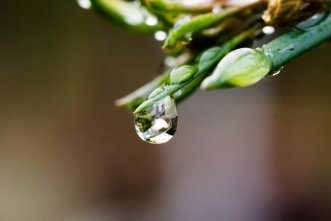
We generally use our yard as a place for relaxation, children and pet play areas, family gatherings and for some, a blissful seclusion from the busy world we live in. But were you aware that your lawn provides a host of impressive environmental benefits?
Your lawn plays a vital ecological role of cooling the environment, cleaning the air by neutralizing pollutants, preventing soil erosion, absorbing and filtering rain water and most importantly providing essential oxygen.
Cools the Environment
- Provides a substantial reduction to the heat island effect caused by concrete, asphalt and hardscapes.
- Has a natural cooling effect on the earth’s atmosphere; the grass blades act as an evaporative cooler transpiring water to chill itself which in turn cools the environment.
- Seventy (70) tons of air conditioning has an equivalent cooling effect as (8) eight average sized lawns.
Cleans The Air
- Through their natural photosynthesis process they remove carbon dioxide from the air.
- Captures dust, smoke and other pollutants we would normally breathe if not trapped by grasses.
- Consumes greenhouse gas and converts into oxygen.
- An acre of grass can absorb hundreds of pounds of sulfur dioxide per year.
Prevents Soil Erosion and Stabilizes Dust
- Protects the soil from wind and water erosion.
- Stabilizes soil erosion through its fibrous root system by knitting the soil together to prevent its movement.
- Grasses can trap 12 million tons of dust and dirt nationwide in 1 years time.
1
Benefits of Absorbing Rainwater
- Slows down and reduces runoffs from hardscapes, parking lots and roads.
- Captures and filters rainwater, restores soils and recharges groundwater.
- Rainwater filtered through a healthy lawn is 10 times less acidic then water running off of a hardscape.

Tips on How to Maintain A Healthy Lawn Under Drought Conditions
Perennial Plantings Improves and Restores the Soil As grass is a perennial plants, it root structure dies during the winter season but grows back come spring. In turn, the dead roots begin to break down and contribute organic matter into the soil properties. Ultimately the organic matter will make the soil more fertile, water and air filter friendly and improves the overall quality of the soil.
Don’t Over Water to Compensate for “Non Watering Restrictions” When over watering occurs your grass roots will grow horizontally instead of vertically. Surprisingly less water encourages the roots to work harder and in turn they grow deeper into the soil in search of moisture. This optimizes their ability to trap carbon while releasing oxygen.
Incorporate Native Plants in Your Landscape Native plants suitable for your climate is vital in creating a pollinator environment for the food and habitat needed by beneficial contributors such as bees, butterflies and hummingbirds.
If you would like to explore the benefits of having an environmentally friendly lawn or just need help acquiring an extraordinary landscape, please contact the Designscapes Colorado team at info@designscapes.org and we will be happy to assist you.
Love Your Environment! Love Your Lawn!
